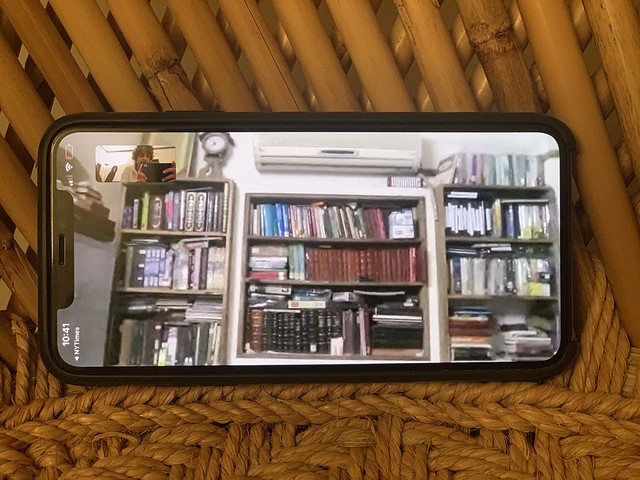
City Life – Scholar Abdul Sattar in Quarantine, Pahari Imli

His isolated life.
[Text and photos by Mayank Austen Soofi]
It’s nothing less than magic. So quiet, when it used to be so noisy.
The Matia Mahal bazar in Old Delhi is usually always crowded. The streets perpetually milling with people. Even at night, even beyond midnight.
“But now it has the sannata (silence) of a qabristan (graveyard),” says Abdul Sattar. The frail-seeming elderly scholar is talking on WhatsApp video from the isolation of his second-floor home in Pahari Imli neighbourhood, that skirts the bazar— the pictures are taken through the phone screen that connects him to The Delhi Walla.
In a voice so faint that he has to make great effort to make himself heard, Mr Sattar confesses that the corona-bound curfew has made no change in his lifestyle. “I’m a retired man, I’ve been staying home for long, I rarely leave my books.”
The gentleman shares his house with his son and his son’s family. His living quarters primarily comprise a large room lined with leather bound books, medicines, and with his collection of ink pen gathered from across the world. It is altogether the bedroom where he sleeps, the study where he writes and reads, and the drawing room where, in “normal days,” he would meet visitors. Those eager people would mainly consist of young ambitious English-speaking writers, coming all the way from New Delhi with the dream of writing their own treatise on Old Delhi, and hoping to get important droplets of historical information from Mr Sattar, a man considered to be well-versed in the Walled City’s past. There have been instances when these visitors would borrow one or a few of his precious books, and never return them.
The ongoing enforced isolation, however, keeps the gentleman aloof from such folks.
Mr Sattar chuckles at the scenario.
He says his daily schedule stays the same. He gets up at five in the morning and is served breakfast of paapaes, eggs and chai by his daughter-in-law, Umama—she is in fact holding the phone during this interaction. Later, Mr Sattar settles down with the final draft of his book on poet Iqbal on which he has been at work for several years. Post-lunch, he takes a siesta after which he busies himself scanning “the old newspaper cuttings related to pre-Partition Delhi.”
At night, “I listen to sad Hindi film love songs.”
And finally, he lies down on the TV-facing mattress to sleep, with the beloved books for roomies.
“I hope the virus goes away by May 1,” he says. “That’s the day when I will turn 75.”
For that special day surely, he says, he will like to go out into the streets.
A scholar in seclusion


Recent Comments